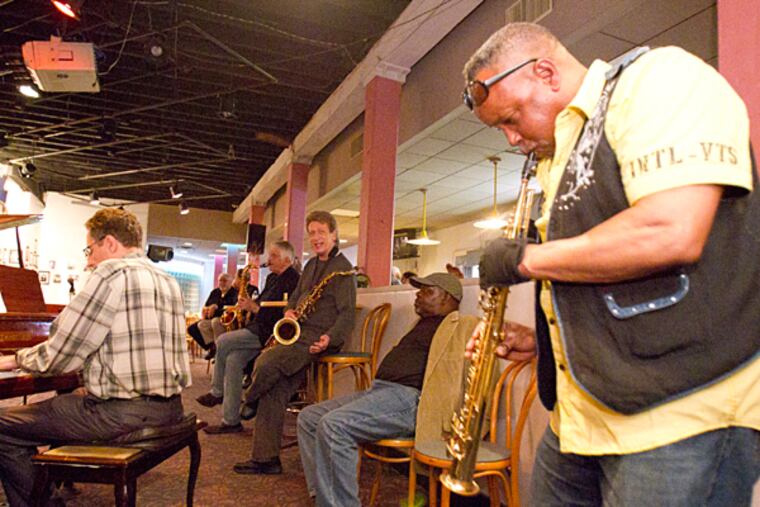After 25 years, 23rd Street Café, and its jazz jams, will end
After 25 years and more than 1,300 Tuesday-night jazz jam sessions at Center City's 23rd Street Cafe, the horns, drums, basses, guitars, violins, harmonicas, and singers will soon be silenced for good. The property at 223 N. 23d Street will be demolished this summer, likely to make way for condominiums.

After 25 years and more than 1,300 Tuesday-night jazz jam sessions at Center City's 23rd Street Cafe, the horns, drums, basses, guitars, violins, harmonicas, and singers will soon be silenced for good. The property at 223 N. 23d Street will be demolished this summer, likely to make way for condominiums.
(No firm date has been set for that demolition, so the jams will keep going until . . . they can't.)
The concept, a jam session open to amateur and professional musicians and singers of all ages and skill levels, was the brainchild of Dutch architect Herman DeJong, jazz lover and onetime amateur bassist.
The sessions, originally called Herman DeJong and Friends Featuring [vocalist] Joy Adams, were first held at the Boat House Row Bar in the Rittenhouse Hotel in 1989.
Six months later, middle management changed the entertainment policy. "After a successful six-month run," DeJong says, "I suddenly had dozens of depressed musicians and patrons on my hands. They lost a friendly place for jazz. We had several offers from other places, but none were attractive. By pure chance, I happened to walk past the 23rd Street Cafe in mid-April of 1990. I walked in, met the owners, Mace and Bob Thompson, saw a grand piano and high ceilings, and realized it would be the perfect place to relocate. With a handshake, we clinched our open-ended deal with management."
Any given Tuesday could run the gamut from the sublime to music that was, shall we say, enthusiastically rendered. Drummer "Big Jim" Dofton, who has been there since day one and has run the sessions for more than 12 years, showed the patience of a saint and a heck of a sense of humor. He remembers: "Some nights, over 30 musicians and singers would show up, and it was my job to try and make sure everyone got the chance to perform. It could be overwhelming at times, but it was worth it."
Jams could include big-name pros, like saxophonist Larry McKenna, singer Karrin Allyson, and organist Joey DeFrancesco; a 13-year-old girl singer trying to make like Streisand; a rock guitarist who wanted to try his hand at jazz; a 79-year-old Dixieland trumpeter who convinced one and all that he was 92; City Councilman Thacher Longstreth vocalizing on "Makin' Whoopee"; a blues harmonica player; Common Pleas Court Judge Richard Klein sitting in on drums; a retired veterinarian on clarinet; an Episcopal priest at the piano; and Harold "Hal" Ruttenberg, a cardiologist who moonlighted as an alto saxophone player.
McKenna was a frequent visitor through the years. "I was impressed with the fact that people from different backgrounds and different professions were united by a love for jazz and had found a place to play our music for 25 years," he says. "I was honored last year, when Herman DeJong presented me with a Lifetime Achievement Award at the club, which put me in the company of Tony Williams, Bootsie Barnes, and WRTI radio's Bob Perkins and Bob Craig. Let's hope a new venue can be found to make it possible to continue with this fine tradition."
"I have great memories of the 23rd Street Cafe," DeFrancesco says. When his father, organist "Papa" John DeFrancesco, came out with his first record, the release party was held there. "He played there every Friday after that for a while," DeFrancesco says. "Whenever I wasn't touring, I would come and sit in."
Parents brought their kids in to perform in front of a live audience for the first time. Birthdays were celebrated, complete with cake. Marriages were proposed; births, weddings, confirmations and bar mitzvahs were celebrated; and deaths were mourned. The departed, including pianist Father John D'Amico, bassist Mifflin Baker, and original house pianist Ron Lowden, were given tributes at the cafe.
"To arrive at 23rd Street on a Tuesday night often felt as if I were joining family," says singer Mary Ellen Desmond. "From my very first visit to the jam session, when I was a newcomer to the Philadelphia jazz scene, I was made to feel welcome. That was many years ago, and to this day, I maintain connections and friendships I made there. Musically? My visits to the 23rd Street truly helped me grow as a performer, and I will always be grateful."
DeJong says he immediately set out to find a new location for the jam when he found out the sale of the 23rd Street site was no longer just a rumor. But he's given up for the moment, thinking the time for such a thing, as remarkable as it was, may have passed. "Maybe," he says, "25 years is enough."